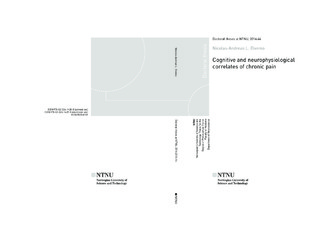| dc.contributor.author | Elvemo, Nicolas-Andreas L. | |
| dc.date.accessioned | 2016-03-08T11:40:47Z | |
| dc.date.available | 2016-03-08T11:40:47Z | |
| dc.date.issued | 2016 | |
| dc.identifier.isbn | 978-82-326-1429-5 | |
| dc.identifier.issn | 1503-8181 | |
| dc.identifier.uri | http://hdl.handle.net/11250/2381759 | |
| dc.description.abstract | Sammendrag:
Bakgrunn: Kroniske smerter er utbredt i befolkningen, og pasientgruppen rapporterer hyppig
kognitive svekkelser i tillegg til smertene. Kognitive svekkelser er avdekket i flere ulike
domener, som arbeidshukommelse og beslutningstagning. Depresjon og søvnproblemer er
også svært utbredt blant disse pasientene, og disse kan i seg selv gi kognitive svekkelser i de
samme domenene som smerter.
Formål: Målet med denne avhandlingen var å øke vår forståelse for kognitive svekkelser hos
pasienter med kroniske smerter, og hvordan disse svekkelsenes henger sammen med
sentralnervesystemet.
Metode: Vi undersøkte 20 pasienter med kroniske smerter og 20 kontrollpersoner, med
tilsvarende alder og utdanningsnivå. Pasientene ble undersøkt med nevropsykologiske tester,
fysiologiske målinger (funksjonell MRI og målinger av autonome funksjoner som puls,
hudkonduktans og blodtrykk) og ulike spørreskjema.
Hovedfunn: Vi avdekket at søvnproblemer er viktigere for endring av hjerneaktivitet
undersøkt med funksjonell MR enn smerter og depresjon når smertepasientene gjør oppgaver
som belaster arbeidshukommelsen. Vi avdekket at smertepasientene hadde mindre
autonomrespons enn kontroller før dårlige beslutninger, som er en mulig
forklaringsmekanisme på dårligere emosjonell beslutningstagning hos smertepasienter.
Videre avdekket vi at pasientene hadde redusert responsivitet på belønning sammenlignet
med kontrollene, og at endringen kunne knyttes til hjerneforandringer i hjernens
belønningskretser.
Konklusjon: Kognitive svekkelser hos smertepasienter kan kobles til endringer i flere ulike
fysiologiske systemer. De fysiologiske mekanismene og følgene av kroniske smerter er trolig sammensatte og mangfoldige. Det er et behov for økt forståelse for hvordan kronisk smerte
påvirker disse systemene, for på lang sikt å kunne gi pasientgruppen behandling eller lindring
for de i dag utbredte kognitive svekkelsene, og kanskje også den kroniske smerten i seg selv. | nb_NO |
| dc.description.abstract | Summary:
Cognitive complaints are common among patients with chronic pain. This thesis presents
three investigations into the neurophysiological, neuropsychiatric and neuroanatomical
aspects of cognitive impairments.
The first paper describes a functional magnetic resonance imaging (fMRI) study of brain
activation of chronic pain patients and their controls during working memory tasks. The study
determined that activation and deactivation was reduced for pain patients compared to
controls, and that sleep problems in the patients was important for the difference. The second
paper describes a test of autonomic function during a decision-making task. Patients had less
autonomic activation prior to decisions, which suggests a mechanism for impaired emotional
decision making in these patients. The third paper describes an investigation into reward
responsiveness in chronic pain patients and its link to cerebral anatomy. Patients proved to be
significantly less responsive to rewards than controls, and patients had a different relationship
between reward responsiveness and anatomy of a cerebral reward center.
In total, our results suggest that some cognitive processes in chronic pain patients are different
from those of controls, and that these differences involve anatomy, physiology and function
of the brain in a complex interplay with each other. | nb_NO |
| dc.language.iso | eng | nb_NO |
| dc.publisher | NTNU | nb_NO |
| dc.relation.ispartofseries | Doctoral thesis at NTNU;2016:44 | |
| dc.relation.haspart | Paper 1:
Elvemo, Nicolas-Andreas L.; Landrø, Nils Inge; Borchgrevink, Petter Chr.; Håberg, Asta.
A particular effect of sleep, but not pain or depression, on the blood-oxygen-level dependent response during working memory tasks in patients with chronic pain. Journal of Pain Research 2015 ;Volum 8. s. 335-346 <a href="http://dx.doi.org/10.2147/JPR.S83486" target="_blank"> http://dx.doi.org/ 10.2147/JPR.S83486</a>
This work is published and licensed by Dove Medical Press Limited. The full terms of this license are available at https://www.dovepress.com/terms.php and incorporate the Creative Commons Attribution - Non Commercial (unported, v3.0) License. By accessing the work you hereby accept the Terms. Non-commercial uses of the work are permitted without any further permission from Dove Medical Press Limited, provided the work is properly attributed. For permission for commercial use of this work, please see paragraphs 4.2 and 5 of our Terms. | |
| dc.relation.haspart | Paper 2:
Elvemo, Nicolas-Andreas L.; Nilsen, Kristian Bernhard; Landrø, Nils Inge; Borchgrevink, Petter Chr.; Håberg, Asta.
Patients With chronic pain lack somatic markers during decision-making. Journal of Pain Research 2014 ;Volum 7. s. 425-437
<a href="http://dx.doi.org/ 10.2147/JPR.S62492" target="_blank"> http://dx.doi.org/ 10.2147/JPR.S62492</a>
This work is published and licensed by Dove Medical Press Limited. The full terms of this license are available at https://www.dovepress.com/terms.php and incorporate the Creative Commons Attribution - Non Commercial (unported, v3.0) License. By accessing the work you hereby accept the Terms. Non-commercial uses of the work are permitted without any further permission from Dove Medical Press Limited, provided the work is properly attributed. For permission for commercial use of this work, please see paragraphs 4.2 and 5 of our Terms. | |
| dc.relation.haspart | Paper 3:
Elvemo, Nicolas-Andreas L.; Landrø, Nils Inge; Borchgrevink, Petter Chr.; Håberg, Asta.
Reward responsiveness in patients with chronic pain. European Journal of Pain 2015 ;Volum 19.(10) s. 1537-1543
<a href="http://dx.doi.org/ 10.1002/ejp.687" target="_blank"> http://dx.doi.org/ 10.1002/ejp.687</a>
© 2015 The Authors. European Journal of Pain published by John Wiley & Sons Ltd on behalf of European Pain Federation - EFIC®.
This is an open access article under the terms of the Creative Commons Attribution-NonCommercial-NoDerivs License, which permits use and distribution in any medium, provided the original work is properly cited, the use is non-commercial and no modifications or adaptations are made. | |
| dc.title | Cognitive and neurophysiological correlates of chronic pain | nb_NO |
| dc.type | Doctoral thesis | nb_NO |
